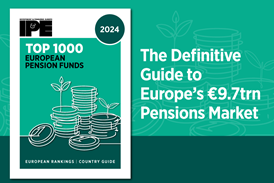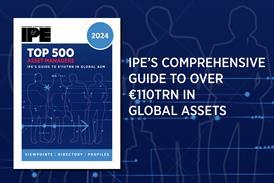Richard Hancock
Comments - Page 2
"[...] and members should be able to access affordable, impartial advice."
Perhaps it's not possible to provide affordable advice that is truly impartial? Perhaps people contemplating a transfer, need to accept that truly impartial advice is going to be very expensive and could well become a sunk cost (if the advice is not to transfer)?"Alexa, invest SEK4.25bn in Swedish state’s first green bond." (That would/could be quite a fat-finger error.)
"The market for 1e plans, which give the option to choose up to 10 investment strategies, is limited to people with a minimum annual salary of CHF126,900. [...] The number of possible insured people is very limited and thus the plans are not an alternative, but a supplement to the basic pension, he added."
I did wonder if that CHF126,900 figure was a typo, but a quick search confirmed the order of magnitude at least: "A 1e pension plan offers a flexible option for those on salaries between CHF 127,980 and CHF 853,200", according to another source. So, presumably, very few people would be eligible.
And I wish they'd called it a "1(e)" pension, so I don't keep misreading it as either "le" (French masculine definite article) or an abbreviation of "premiere". I suppose it could also be written, in English, as "Article 1e", since I understand the "1e" is actually Article 1e of the Swiss Ordinance on Occupational Retirement, Survivors’ and Disability Benefit Plans (BVV 2). (Thank you for letting me vent on that.)“Now is not the time for them to be increasing investment risk. Rather, where possible, trustees should consider reducing risk, taking market opportunities to increase hedging programmes and contemplate lower risk contractual cash flow matching investments.”
Strange, to me at least, to be suggesting short term actions. I would have thought it would have been more sensible to sit things out over the next 6/12/18 months and see where the dust settles. Fine to look at medium and long term plans, but I'd personally be wary of fiddling too much while the pandemic has made things so uncertain."The interim regime has mandated that no profit should be taken within the first three years, unless the scheme is in a position to secure members’ benefits with an insurance company."
That raises an interesting point: is it likely that a consolidator would actually decide to pursue a "buy out" with an insurer? In other words, if trustees decide to go down the consolidation route, does that effectively preclude an eventual "buy out"?
I'm assuming that the "best" outcome for members is a "buy out", since an insurer is hopefully the best capitalised and regulated entity to stand behind the promise to pay pensions. So perhaps it would be inappropriate for trustees to do something that precluded the possibility of a "buy out"?Writing as someone in the UK with a yet-to-be-drawn (UK) DC pension, this all sounds horrendously complicated. But perhaps it needs to be if you want to stick to a collectivist approach?
It sounds like there is no "self-select" option, so that an individual member could choose what they want to invest in. And what happens when a member reaches pension age: are they essentially forced into a low-risk strategy, but without the fixed income that would be provided by an annuity?Guy Opperman, minister for pensions and financial inclusion wrote a piece on this in CityAM. In it, he wrote: "While the publication of interim guidance is a positive step, I must enforce the message that this is an interim regime. Market participants should not assume that the permanent regime will automatically replicate the interim one."
I'm sure this is addressed in detail elsewhere (and I will look to find it), but it does seem strange that anyone would set up a superfund under the interim regime when there is a risk that the permanent regime could be significantly different. Could superfunds be easily "unwound" if the permanent regime made them much less attractive than under the interim regime? Or is it that the "interim regime" is really just a draft of the permanent regime, so no superfund could be set up under the "interim regime"?"Moreover, the LCP analysis reveals that between 10 March and 18 March, debt-market volatility and rising interest rates wiped some £150bn (€167bn) from the total pension liabilities as investors sought shelter in fixed income."
I struggled to get my head around that: if "investors sought shelter in fixed income", surely prices are (ceteris paribus) likely to rise and yields, therefore, fall? Or am I incorrectly conflating yields and interest rates?
The source report (which you kindly linked to), states: "The key IAS19 accounting assumption is the discount rate and this too has seen unprecedented market movements since the start of 2020. Over eight days in March 2020, IAS19 discount rates increased by around 1.5% pa which, all else equal, corresponds to a c30% or £150bn drop in FTSE100 pension liabilities. This increase was driven by rising credit spreads (the difference between corporate and government bond yields) which, as shown in the chart below, spiked at c1.8% pa in mid-March."
Having looked more generally at the source report, I'm wondering if your statement that "investors sought shelter in fixed income" could have been written more accurately as: "investors sought shelter in government bonds" (e.g. "fixed income" could refer to corporate bonds)?
Apologies if I'm being pedantic (or wrong), but I did generally struggle with the reference to "fixed income".
It's good to see IPE still up and running during the pandemic and I hope everyone is managing to stay as safe as possible: the first rule of pension club is to live long enough to draw one.This sounds tremendously ambitious. I'd much rather they focused on "where risks should ultimately be managed by institutions". For example, if employers are, quite understandably, disinclined to offer defined benefit pensions, could the insurance industry offer something like deferred annuities at a price that workers would be willing to pay?
Interesting article, thanks. A very very minor point regarding the use of the term "members" in the first and third paragraphs: I originally thought it meant "members of pension schemes", but I now think it means "pension schemes that are members of (i.e. covered by) the insolvency fund". Maybe it's worth reserving the term "members", solely to mean "members of pension schemes"?
Hi Nick,
Having said that I had no suggestion of how best to characterise the changes made in 2014/2015, I've done a bit of research and think that I can now suggest a reasonable way to characterise the changes.
I stumbled across a "Budget 2014: greater choice in pensions explained" fact sheet (https://assets.publishing.service.gov.uk/government/uploads/system/uploads/attachment_data/file/301563/Pensions_fact_sheet_v8.pdf).
Having read that fact sheet (and I appreciate it may not precisely reflect what was to be enacted in law), the focus seems to be on the movement to "full flexibility" when it comes to taking money from a "pension pot" from age 55.
It is not that, prior to the changes, people were required to purchase an annuity (any requirement to do so having been fully removed in Finance Act 2011), but that there were limits placed on the amount that could be taken in capped drawdown and that there was a "penalty" tax charge of 55% if people wanted to "withdraw the whole pot".
So, I'd suggest a reasonable way to characterise the changes made in 2014/2015 would be to say that: (i) any limits on the amount that could be withdrawn from age 55 were removed; (ii) the rate of tax payable on any money withdrawn (above and beyond the tax free amount) was reduced from the "penalty" rate of 55% to the taxpayer's marginal rate of income tax. So, nothing at all to do with annuities.
Best wishes,
Richard."The UK government removed the requirement for people in defined contribution (DC) approaching retirement to buy an annuity in a policy decision made in 2014 and effective from 2015."
Why is the above still misreported in this way? The requirement to buy an annuity was fully removed in Finance Act 2011 (http://www.legislation.gov.uk/ukpga/2011/11/pdfs/ukpga_20110011_en.pdf).
Budget 2010 (June): "1.117 The Government will end the existing rules that create an effective obligation to purchase an annuity by age 75 from April 2011 to enable individuals to make more flexible use of their pension savings. The Government will shortly launch a consultation on the detail of this change and will introduce transitional measures for those yet to secure a retirement income who will reach 75 in the meantime."
Budget 2011: "2.52 Pensions annuitisation – The June Budget 2010 announced that the effective requirement to annuitise by age 75 would be removed from April 2011. Draft clauses were
published on 9 December 2010 following consultation on the details of the change during summer 2010."
I have no suggestion of how best to characterise the changes made in 2014/2015, but the characterisation you provide is incorrect.As someone who's not familiar with the situation in the Netherlands, it would be interesting to know how pensioners feel about potential cuts to their income.
Are the potential cuts something that pensioners are resigned to accepting? Or are they considered to be anathema (e.g. given your reporting that "VCP reminded the government of its responsibility for maintaining purchasing power for retirees")? Do most retirees have high and inflexible outgoings (e.g. rent payments) that mean they could not easily reduce their spending if their incomes were cut?It's a very interesting judgement (https://www.bailii.org/ew/cases/EWHC/Ch/2019/2245.html) and demonstrates that judges are not simply nodding things through.
There's a rather amusing observation (item 163 in the judgement) that PAC seemed almost to be dissing itself in order to argue in favour of the transfer of policies.
I was marginally involved in another similar (though non-annuity) case as a policyholder -- in that case the transfer was approved -- and I was extremely impressed by the care taken by counsel in presenting the case and the judge in reaching his decision.
I wonder if sales literature for annuities will now start to explicitly spell out the possibility of a "Part VII" (Financial Services and Markets Act 2000) transfer?Thanks for providing a link to the committee’s full report.
The most troubling comment from David Fairs, Executive Director for Regulatory Policy, Analysis and Advice at TPR, is: “The most disengaged trustees are blissfully unaware that they are failing savers by not running their schemes properly.” (While this isn't reported in this IPE article, it is included in the press release on TPR website. And that press release has an even stronger headline: "New figures show why small schemes must quit the market".)
What is/should TPR be doing about savers who are being failed by disengaged trustees? Is it too under-resourced to do what it ought to? Does the law preclude it?"NOW: Pensions" is a rather confusing name; I kept being thrown by it as I was reading the article. Perhaps it's worth always quoting it (with double quotes) so that it's clear that the whole phrase is the name? Probably worth considering doing that for any name that includes punctuation marks.
It would be interesting to know what sort of impact this might have on the PPF, given it would be losing levy payers.
Well, it's good that regulators will finally be getting around to doing something about this. But it's hardly a new problem, is it?
It sometimes feels like financial products are rarely tested before they're offered to the public; they're only really tested post-release, by exposure to the real world. Surely it's not beyond the intellectual capacity of those in the financial services industry to do some "what if" thinking?I can see both sides of the argument. If the college has "fewer than 20" affected employees, it seems unnecessarily risky to keep them in the USS and, as a result, face an unlimited potential liability. But if the college walks away from the USS, how many other employers (i.e. in a similar position) would likely also withdraw and would this undermine the USS?
One other thought: if you're an academic, how important is it that an employer you're considering moving to is part of the USS? If it's very important then, however sensible the college's decision may appear, it may significantly reduce its ability to attract the best talent.













Commented on: 2020-09-08T12:18:31.783
UK roundup: LCP, Royal London call for more support in DB transfer advice